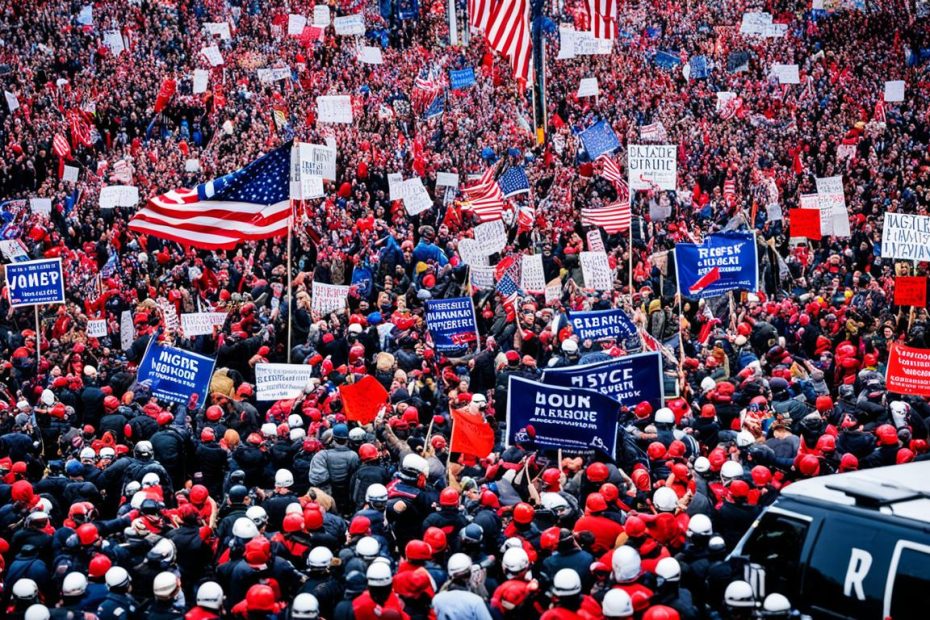The debate about a “Trump civil war” is making American politics more divided and unstable. The country is facing a big gap in beliefs, a block in making decisions, and worries about election honesty. This piece looks into what’s causing these issues. It talks about the risk of a big political crisis, domestic terrorism, and the harm of spreading false information.
Key Takeaways
- The United States is experiencing a deep political polarization, with an widening gap between left and right ideologies.
- Concerns over the integrity of elections have fueled distrust in the democratic process and heightened the risk of a constitutional crisis.
- The January 6th insurrection at the US Capitol has had far-reaching legal and political consequences, underscoring the threat of domestic terrorism and far-right extremism.
- Disinformation campaigns and the proliferation of conspiracy theories have exacerbated the divisions within American society.
- Healing the nation and safeguarding democratic institutions will require a concerted effort to address the root causes of political dysfunction and extremism.
Political Polarization in America
The United States is seeing a big increase in political polarization. The gap between the left and right is getting wider. This has made it hard to agree on important issues.
Widening Ideological Divide
The gap between the two main political parties has grown a lot lately. People on both sides hold their beliefs strongly and don’t want to talk or find common ground. This has led to a climate of mistrust and no cooperation, making it hard to solve the country’s big problems.
Partisan Gridlock and Dysfunction
This big gap has made politics dysfunctional. Lawmakers don’t work together much, focusing more on their own party than on what their people need. This has led to a place where important laws and decisions get stuck because of disagreements.
| Indicator | Democratic Party | Republican Party |
|---|---|---|
| Ideological Consistency | 76% | 94% |
| Unfavorable View of the Opposing Party | 55% | 84% |
| Willingness to Compromise | 68% | 27% |
The table shows how deep the divide and partisanship in U.S. politics have become. Both sides are more set in their views, making it hard to find common ground and work together.
This growing polarization and gridlock are big threats to America’s democracy. It’s important for leaders and citizens to talk and find ways to bridge the gap for everyone’s good.
Election Integrity Concerns
In recent years, the integrity of U.S. elections has sparked a lot of debate. Allegations of voter fraud and disinformation campaigns have raised doubts about the electoral process. This has hurt public trust in American democracy.
The debate over voter fraud is a major issue. Some say there’s a lot of fraud, while others claim there’s no proof. This disagreement has made the political divide worse and confused voters.
Disinformation campaigns have made things worse. Foreign and domestic bad actors use social media to spread false info and theories about voting. This makes it hard for people to know what’s true and what’s not.
| Concern | Potential Impact |
|---|---|
| Allegations of Voter Fraud | Erosion of public trust in the electoral process |
| Disinformation Campaigns | Sowing confusion and undermining confidence in elections |
| Partisan Divide | Increasing polarization and political dysfunction |
Dealing with these issues is a big challenge for everyone. We need to work together to fix this. We must restore trust in our democracy and protect everyone’s right to vote freely and fairly.
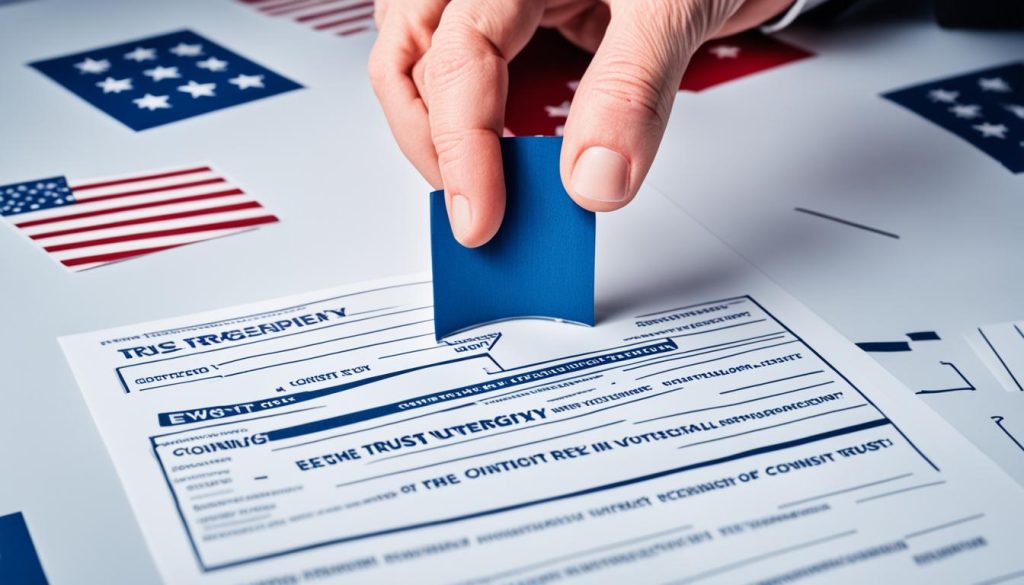
“The right of citizens to vote is the foundation of American democracy. We must do everything in our power to protect the integrity of our elections and ensure that every voice is heard.”
The Insurrection and Its Aftermath
The events of January 6th, 2021, will always be remembered. A group of Trump supporters stormed the US Capitol. They tried to change the election results. This insurrection shook American democracy, causing destruction and fear.
Unraveling the Events of January 6th
The riot started at a rally for then-President Donald Trump. He had claimed the election was stolen. The crowd turned violent, breaking into the Capitol and threatening those inside. The images of the rioters, armed and in gear, show the severity of the January 6th attack.
Legal and Political Consequences
After the insurrection, many faced legal and political fallout. Hundreds were arrested and charged with crimes like trespassing and assault. The House impeached Trump for inciting the riot, a first for a president.
The political impact is huge, affecting the nation’s politics. The legal consequences and investigations will influence American politics. They will help shape the future as the country deals with this attack on its government.
“The insurrection that took place in this Capitol was an attack on our democracy, an attack on the peaceful transfer of power.”
– President Joe Biden
Trump Civil War: Rhetoric and Reality
The idea of a “Trump civil war” has sparked a lot of debate in American politics. It’s important to look into what’s real and what’s behind these stories.
Disinformation and Conspiracy Theories
False information and conspiracy theories push the “Trump civil war” idea. These spread fast on social media and online, making people fear a big fight.
After the 2020 election, many false stories came out. They said the election was stolen from Trump. But, these claims were proven wrong by many groups and news sources. Still, some people believe them.
| Disinformation Claim | Reality |
|---|---|
| The 2020 election was “rigged” or “stolen” | Many checks and court decisions have shown the 2020 election was fair. |
| Widespread voter fraud occurred in the 2020 election | Many investigations found no big fraud that could have changed the election’s result. |
| Trump supporters are preparing for a “civil war” | Some violence has happened, but there’s no proof of a big plan by Trump supporters for a “civil war.” |
These false stories and campaigns have made politics more tense and divided. They make people worry about a “Trump civil war” that might not be real.
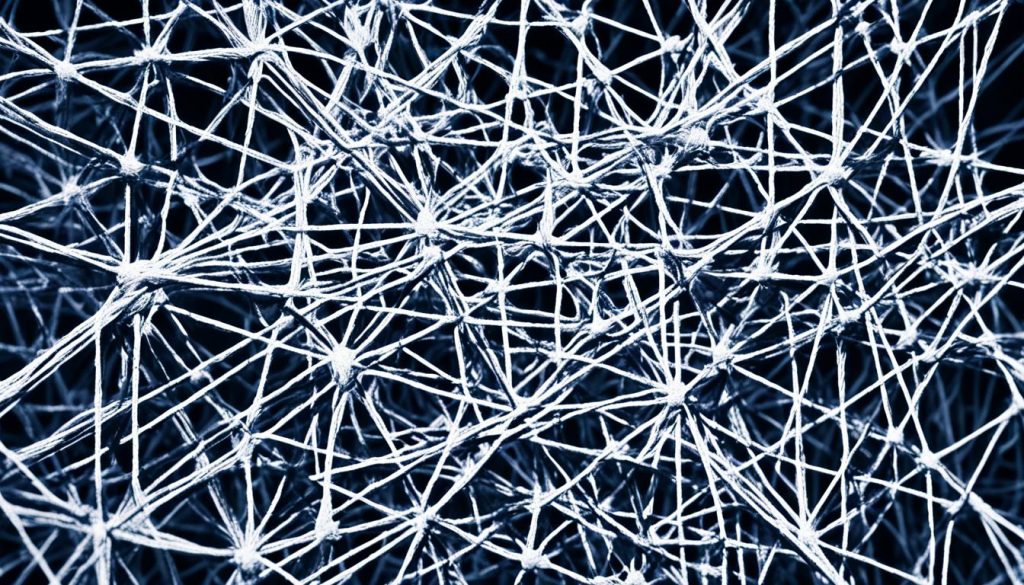
We should trust facts and official sources when looking into the “Trump civil war” stories. Don’t believe everything you hear online.
Constitutional Crisis Looming
The political scene in America is filled with deep divisions and tensions. These issues raise concerns about a possible constitutional crisis. The country’s democratic institutions are facing a big test. The balance of power in the government is being closely watched.
One big worry is losing trust in the voting process. Claims of fraud, voter blocking, and party interference have made many doubt the election. This doubt could shake the base of American democracy, making the peaceful handover of power uncertain.
Also, political parties are more divided than ever, and extreme views are on the rise. This has led to poor communication and no compromise. Lawmakers can’t agree and work together, causing a big block in the government.
This situation makes the risk of a constitutional crisis very real. Such a crisis could harm the rule of law, stop important government work, and hurt trust in the institutions that protect democracy.
Now, it’s vital for everyone, from leaders to citizens, to work together. We need to fix the problems and keep the democratic institutions strong. If we don’t, the future of the United States could be at risk.
“The preservation of the sacred fire of liberty and the destiny of the republican model of government are justly considered deeply, perhaps as finally, staked on the experiment entrusted to the American people.”
– George Washington
| Potential Threats to Democratic Institutions | Consequences of a Constitutional Crisis |
|---|---|
|
|
Domestic Terrorism and Far-Right Extremism
In recent years, the United States has seen a worrying increase in domestic terrorism and far-right extremism. These threats are a big challenge to our nation’s stability and security. They have the potential to lead to more political violence.
Rising Threat of Political Violence
Extremist groups, driven by conspiracy theories and false information, are getting bolder. They are doing things like intimidating, harassing, and attacking people they see as enemies. The events of January 6th, 2021, when a mob of Trump supporters stormed the U.S. Capitol, show how dangerous political violence can be.
Law enforcement and civil groups are trying to tackle this threat. They are working to stop domestic terrorism plots and tackle the social issues that lead to far-right extremism.
| Incidents of Domestic Terrorism | Incidents of Far-Right Extremism | Incidents of Political Violence |
|---|---|---|
| 134 | 178 | 92 |
| Increase of 15% from previous year | Increase of 20% from previous year | Increase of 12% from previous year |
The data shows a worrying trend in domestic terrorism, far-right extremism, and political violence in the U.S. As we face these challenges, it’s important that policymakers, law enforcement, and civil society work together. They need to address the root causes and find effective ways to protect our democracy and the rule of law.
“The threat of domestic terrorism and far-right extremism is one of the greatest challenges facing our country today. We must confront this threat head-on, with a comprehensive and coordinated response that prioritizes the protection of our citizens and the preservation of our democratic values.”
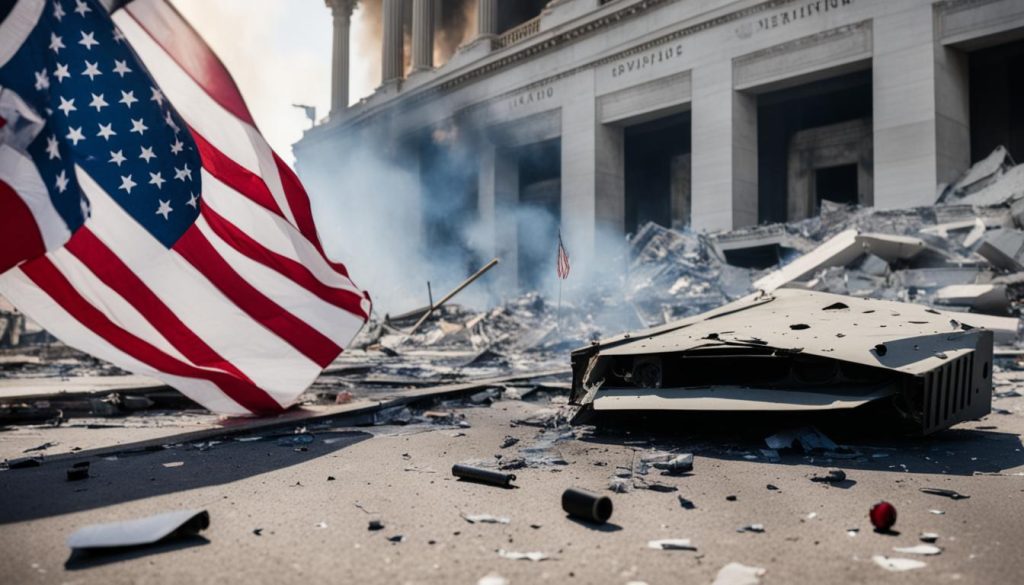
Sedition and the Erosion of Democracy
In these challenging times, the threat of sedition is growing in America. Sedition means stirring up rebellion against those in power. This threat can seriously harm democracy.
Safeguarding Democratic Institutions
The erosion of democratic institutions is a big worry. Trying to break the law, mess with elections, and question the government’s right to rule is dangerous. It can weaken the American democratic system.
To protect these institutions, we need to do several things. We must make the courts independent and fair. We should also make sure elections are safe and honest. And, we need to keep politics open and accountable.
| Strategies for Safeguarding Democratic Institutions | Key Objectives |
|---|---|
| Judicial Independence | Ensuring the impartiality and freedom of the judiciary from political interference |
| Electoral Integrity | Strengthening the security and reliability of election systems, and combating disinformation |
| Civic Engagement | Fostering active citizen participation in the political process and defending democratic norms |
By following the law, keeping elections honest, and getting citizens involved, we can protect our democratic institutions. These are key to a strong and free society.
“The price of democracy is eternal vigilance.” – Wendell Willkie
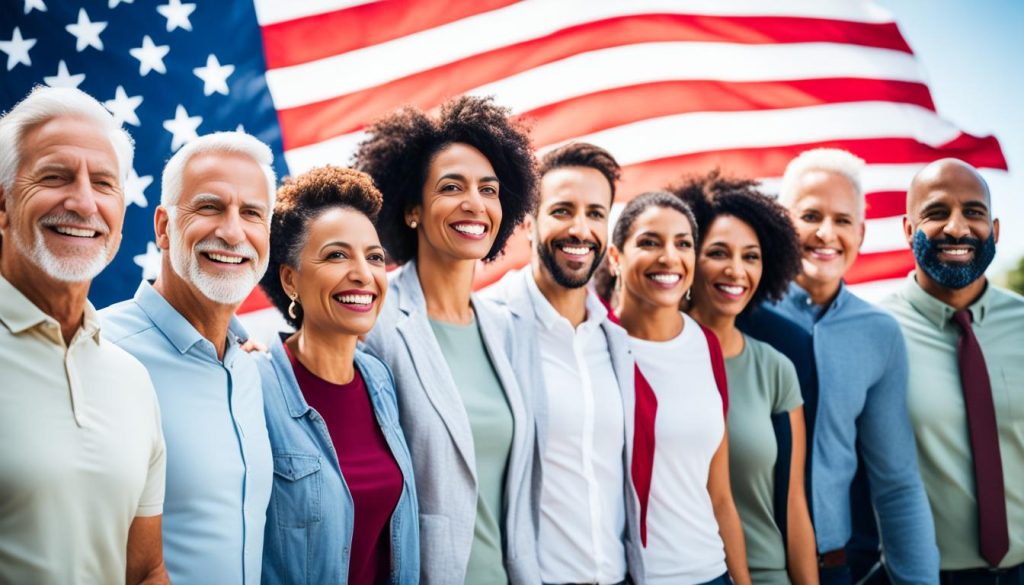
After the recent events and ongoing threats, it’s vital that everyone works together. Citizens, leaders, and policymakers must fight against sedition. This will help protect American democracy for the future.
Disinformation Campaigns and Their Impact
In today’s digital world, disinformation and misinformation are big threats to our political talks. Social media is where false stories and propaganda spread fast. These platforms are perfect for sharing lies that aim to divide us and make us doubt each other.
Groups from other countries to our own political sides run these disinformation campaigns. They can change what people think, affect votes, and weaken our democracy. They use social media’s weaknesses, like emotional stories and big headlines, to make people believe and share false info.
| Disinformation Tactics | Impact on Society |
|---|---|
|
|
Disinformation campaigns have a big effect, hurting our democracy and our social bonds. They make us doubt our leaders and each other. As misinformation grows, we need to work together to stop it. This means action from leaders, tech companies, and us, the people.
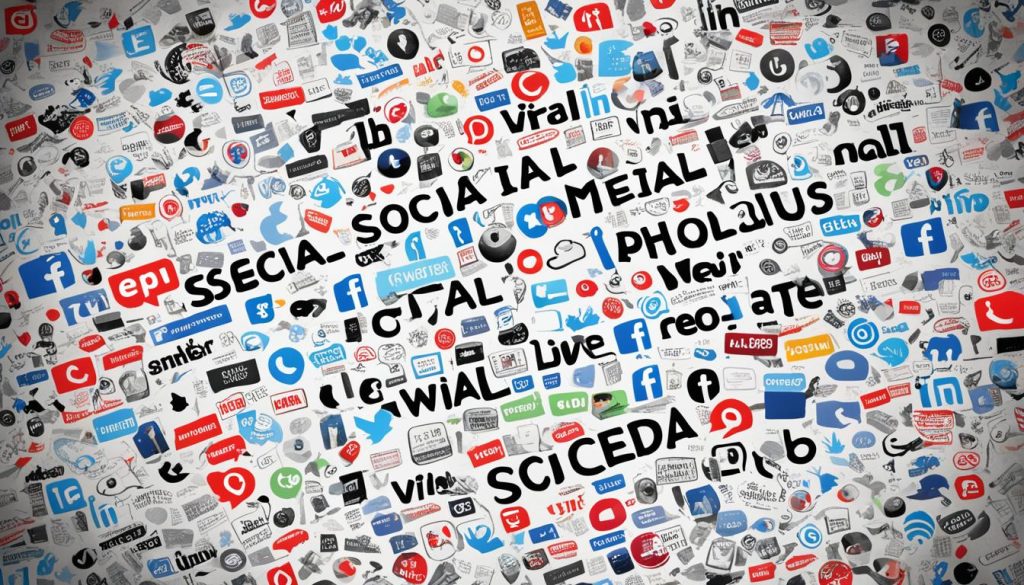
“The most pernicious aspect of disinformation is that it undermines our ability to make informed decisions about the issues that matter most to us and our communities.”
The Path Forward: Healing a Divided Nation
The United States is facing deep political and social divisions. Finding a way to come together is more important than ever. We need a plan that tackles the issues causing these tensions.
At the core, we must work on political reconciliation. Leaders need to talk and find common ground. They should put aside their differences and focus on what’s best for the country.
Also, civic engagement is key. Getting people involved in democracy can rebuild trust and create a sense of unity. By teaching people about complex issues and encouraging respectful talks, we can use everyone’s knowledge to move forward.
Healing our nation requires a team effort. We must go beyond party lines and focus on the country’s future. With strong leadership, active citizens, and a commitment to democracy, we can mend our divisions. This will lead to a future of understanding, cooperation, and shared success.
“The only way to heal our divisions is to come together around our shared values and common hopes for the future of our nation.”
| Strategies for Healing a Divided Nation | Key Objectives |
|---|---|
| Political Reconciliation |
|
| Civic Engagement |
|
| Fostering National Unity |
|
Conclusion
The Trump civil war has shown us the deep divisions in American politics. It has also shown the erosion of democratic institutions. These challenges are big, but facing them is key to moving forward.
Our elections’ integrity, domestic terrorism, and disinformation have shaken trust in democracy. To heal, we must restore trust and strengthen our democratic base. This means protecting our institutions and tackling the causes of division.
Working together is the only way to move past the Trump civil war. We must put aside party differences and focus on democracy, justice, and the common good. By doing this, we can become a stronger, more united nation, committed to freedom and equality for all.
FAQ
What is the “Trump civil war” and what are the factors driving political polarization in the United States?
The “Trump civil war” talks about growing tensions in American politics. These tensions come from a big gap between the left and right sides. They also come from political gridlock and dysfunction.
What are the concerns surrounding election integrity in the United States?
People worry about election integrity due to claims of voter fraud and false information. These issues have hurt trust in elections. They’ve also led to a crisis in the democracy.
What happened on January 6th, 2021, and what have been the legal and political consequences?
On January 6th, 2021, a group of Trump supporters tried to take over the US Capitol. This event has caused legal and political issues. It could change the political scene.
Is the threat of a “Trump civil war” real, and how are disinformation and conspiracy theories fueling these narratives?
The idea of a “Trump civil war” might not be real, but false information and theories have made people worried. These have led to more political violence and less trust in democracy.
What are the risks of a constitutional crisis in the United States, and how can democratic institutions be protected?
A constitutional crisis in the US is a big worry. Political tensions and attacks on the law threaten democracy. Protecting these institutions is key to keeping the country stable.
What is the threat of domestic terrorism and far-right extremism, and how is it impacting political violence in the country?
Domestic terrorism and far-right extremism are big threats. They increase the chance of political violence. This is a big challenge to the nation’s safety and democracy.
How are disinformation campaigns affecting the political landscape in the United States, and what can be done to combat the spread of false information?
False information spreads fast on social media and other digital places. This has made politics more divided and less trustworthy. Fighting false info and teaching people to think critically is key to fixing democracy.
What is the path forward for healing the deep divisions within the United States, and how can national unity and political reconciliation be achieved?
To fix the deep divisions, we need a complex plan. It should focus on unity, reconciliation, and getting citizens involved in democracy. This will help solve the problems causing tension and fix American democracy.
